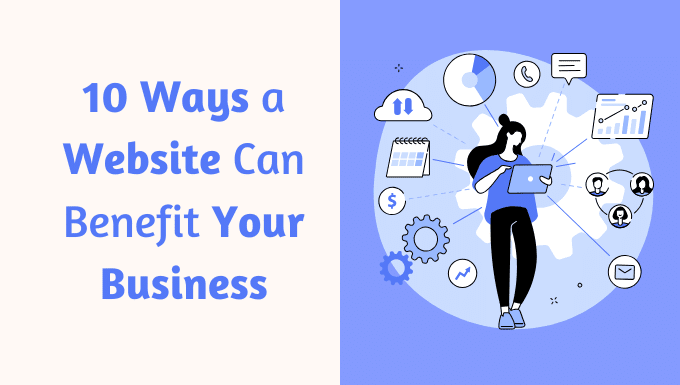In today’s digital age, a strong online presence is essential for businesses of all sizes. A well-designed website is not just a digital business card; it’s a powerful tool that can transform the way you operate and connect with customers. In this comprehensive guide, we’ll delve into the 10 ways a website can benefit your business, exploring each point in-depth to provide a thorough understanding of its importance in the modern business landscape.
1. 24/7 Accessibility
A website provides round-the-clock accessibility to your business. Whether it’s the middle of the night or a public holiday, potential customers can access information, make purchases, or contact you. This constant availability can lead to increased sales and customer satisfaction.
2. Expanded Reach
One of the most significant advantages of a website is its ability to transcend geographical boundaries. It empowers your business to reach a global audience, opening doors to new markets and customers you may have never reached otherwise. This expanded reach can fuel business growth and diversify your customer base.
3. Credibility and Trust
A professionally designed website enhances your business’s credibility and trustworthiness. It’s the digital face of your brand, where customers can learn about your products or services, read testimonials, and get a sense of your company’s values and ethos. A well-crafted website establishes trust, making visitors more likely to engage with your business.
4. Cost-Effective Marketing
Websites offer a cost-effective platform for marketing your business. Online marketing strategies, such as search engine optimization (SEO), content marketing, and social media promotion, allow you to reach and engage your target audience without incurring the high costs associated with traditional advertising. You can tailor your marketing efforts to fit your budget and see a substantial return on investment.
5. Data Collection and Analysis
Websites are powerful tools for collecting and analyzing valuable customer data. Through analytics tools, you can track user behavior, preferences, and demographics. This data is invaluable for making informed decisions, refining your products or services, and creating tailored marketing campaigns that resonate with your audience.
6. E-commerce Opportunities
For businesses in the retail sector, a website can serve as an additional sales channel. By setting up an online store, you can accept payments and reach a broader customer base. E-commerce capabilities provide convenience for your customers and can significantly boost your revenue.
7. Customer Support
Websites aren’t limited to selling products or services; they can also enhance customer support. Features like FAQs, live chat support, and contact forms create avenues for customers to seek assistance or have their questions answered promptly. Excellent customer support through your website can lead to higher customer satisfaction and loyalty.
8. Brand Consistency
Consistency is a fundamental aspect of branding. Your website enables you to control and maintain brand consistency in the digital realm. Through careful design and content management, you can ensure that your brand’s image, messaging, and user experience are aligned across all online touchpoints.
9. Competitive Advantage
In today’s competitive market, having a website is often expected by consumers. By having one, you can gain a competitive advantage over businesses that have not embraced the digital landscape. A well-optimized website can set you apart from the competition and attract more potential customers.
10. Scalability and Growth
Your website can evolve with your business. As you expand, you can add new features, expand your product line, and accommodate more visitors without significant structural changes. This scalability ensures that your website continues to support your growth and adapt to your changing needs.
Getting Started with Your Business Website
Now that you understand the numerous benefits of having a website for your business, it’s time to take action. Here are some steps to get you started:
1. Define Your Goals: Determine your website’s purpose, whether it’s to inform, sell, or provide support.
2. Choose a Domain: Select a memorable and relevant domain name that reflects your brand.
3. Design and Development: Hire a professional web designer and developer or use user-friendly platforms like WordPress, Wix, or Shopify to create your site. Speaking of expert, I’m one, and It take less effort from you to actually contact me. You can reach out to me through my email: contactme@tialuxetech.com, or via any of my social media link on the footer of this post, or you can as well quickly and easily direct message me via my WhatsApp, click here
4. Content Creation: Populate your website with engaging, informative, and SEO-optimized content that speaks to your target audience.
5. Marketing and Promotion: Utilize digital marketing strategies, including SEO, social media, and email marketing, to attract visitors to your website.
6. Regular Updates: Keep your website up to date with fresh content, new products or services, and additional features that enhance the user experience.
7. Analyze and Improve: Use analytics tools to monitor your website’s performance, identify areas for improvement, and make necessary changes to enhance user engagement and conversion rates.
In Conclusion
Your website is more than just a digital asset; it’s a vital component of your business strategy. It opens doors to new customers, enhances credibility, and offers cost-effective marketing opportunities. Embrace the digital era and harness the power of a well-crafted website to drive your business forward.
By implementing these 10 benefits, your website can become a dynamic tool for business growth, a source of trust and credibility, and a means to connect with a global audience. The time to create or enhance your business website is now; it’s a smart investment that can transform your business’s success in the digital age.


